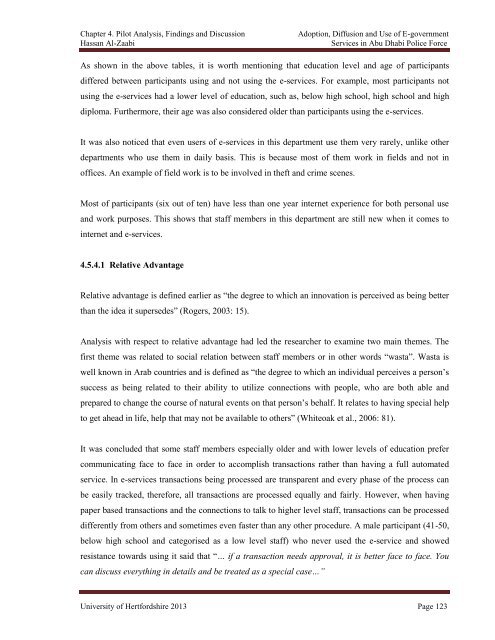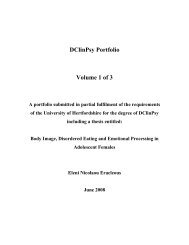- Page 1 and 2:
Adoption, Diffusion and Use of E-Go
- Page 3 and 4:
Adoption, Diffusion and Use of E-go
- Page 5 and 6:
Adoption, Diffusion and Use of E-go
- Page 7 and 8:
Adoption, Diffusion and Use of E-go
- Page 9 and 10:
Adoption, Diffusion and Use of E-go
- Page 11 and 12:
Adoption, Diffusion and Use of E-go
- Page 13 and 14:
Adoption, Diffusion and Use of E-go
- Page 15 and 16:
Adoption, Diffusion and Use of E-go
- Page 17 and 18:
Chapter 1. Introduction Adoption, D
- Page 19 and 20:
Chapter 1. Introduction Adoption, D
- Page 21 and 22:
Chapter 1. Introduction Adoption, D
- Page 23 and 24:
Chapter 1. Introduction Adoption, D
- Page 25 and 26:
Chapter 1. Introduction Adoption, D
- Page 27 and 28:
Chapter 1. Introduction Adoption, D
- Page 29 and 30:
Chapter 1. Introduction Adoption, D
- Page 31 and 32:
Chapter 2. Literature Review Adopti
- Page 33 and 34:
Chapter 2. Literature Review Adopti
- Page 35 and 36:
Chapter 2. Literature Review Adopti
- Page 37 and 38:
Chapter 2. Literature Review Adopti
- Page 39 and 40:
Chapter 2. Literature Review Adopti
- Page 41 and 42:
Chapter 2. Literature Review Adopti
- Page 43 and 44:
Chapter 2. Literature Review Adopti
- Page 45 and 46:
Chapter 2. Literature Review Adopti
- Page 47 and 48:
Chapter 2. Literature Review Adopti
- Page 49 and 50:
Chapter 2. Literature Review Adopti
- Page 51 and 52:
Chapter 2. Literature Review Adopti
- Page 53 and 54:
Chapter 2. Literature Review Adopti
- Page 55 and 56:
Chapter 2. Literature Review Adopti
- Page 57 and 58:
Chapter 2. Literature Review Adopti
- Page 59 and 60:
Chapter 2. Literature Review Adopti
- Page 61 and 62:
Chapter 2. Literature Review Adopti
- Page 63 and 64:
Chapter 2. Literature Review Adopti
- Page 65 and 66:
Chapter 2. Literature Review Adopti
- Page 67 and 68:
Chapter 2. Literature Review Adopti
- Page 69 and 70:
Chapter 3. Research Methodology Ado
- Page 71 and 72:
Chapter 3. Research Methodology Ado
- Page 73 and 74:
Chapter 3. Research Methodology Ado
- Page 75 and 76:
Chapter 3. Research Methodology Ado
- Page 77 and 78:
Chapter 3. Research Methodology Ado
- Page 79 and 80:
Chapter 3. Research Methodology Ado
- Page 81 and 82:
Chapter 3. Research Methodology Ado
- Page 83 and 84:
Chapter 3. Research Methodology Ado
- Page 85 and 86:
Chapter 3. Research Methodology Ado
- Page 87 and 88: Chapter 3. Research Methodology Ado
- Page 89 and 90: Chapter 3. Research Methodology Ado
- Page 91 and 92: Chapter 3. Research Methodology Ado
- Page 93 and 94: Chapter 3. Research Methodology Ado
- Page 95 and 96: Chapter 3. Research Methodology Ado
- Page 97 and 98: Chapter 3. Research Methodology Ado
- Page 99 and 100: Chapter 3. Research Methodology Ado
- Page 101 and 102: Chapter 3. Research Methodology Ado
- Page 103 and 104: Chapter 3. Research Methodology Ado
- Page 105 and 106: Chapter 4. Pilot Analysis, Findings
- Page 107 and 108: Chapter 4. Pilot Analysis, Findings
- Page 109 and 110: Chapter 4. Pilot Analysis, Findings
- Page 111 and 112: Chapter 4. Pilot Analysis, Findings
- Page 113 and 114: Chapter 4. Pilot Analysis, Findings
- Page 115 and 116: Chapter 4. Pilot Analysis, Findings
- Page 117 and 118: Chapter 4. Pilot Analysis, Findings
- Page 119 and 120: Chapter 4. Pilot Analysis, Findings
- Page 121 and 122: Chapter 4. Pilot Analysis, Findings
- Page 123 and 124: Chapter 4. Pilot Analysis, Findings
- Page 125 and 126: Chapter 4. Pilot Analysis, Findings
- Page 127 and 128: Chapter 4. Pilot Analysis, Findings
- Page 129 and 130: Chapter 4. Pilot Analysis, Findings
- Page 131 and 132: Chapter 4. Pilot Analysis, Findings
- Page 133 and 134: Chapter 4. Pilot Analysis, Findings
- Page 135 and 136: Chapter 4. Pilot Analysis, Findings
- Page 137: Chapter 4. Pilot Analysis, Findings
- Page 141 and 142: Chapter 4. Pilot Analysis, Findings
- Page 143 and 144: Chapter 4. Pilot Analysis, Findings
- Page 145 and 146: Chapter 4. Pilot Analysis, Findings
- Page 147 and 148: Chapter 4. Pilot Analysis, Findings
- Page 149 and 150: Chapter 4. Pilot Analysis, Findings
- Page 151 and 152: Chapter 4. Pilot Analysis, Findings
- Page 153 and 154: Chapter 4. Pilot Analysis, Findings
- Page 155 and 156: Chapter 5. Final Study Analysis, Fi
- Page 157 and 158: Chapter 5. Final Study Analysis, Fi
- Page 159 and 160: Chapter 5. Final Study Analysis, Fi
- Page 161 and 162: Chapter 5. Final Study Analysis, Fi
- Page 163 and 164: Chapter 5. Final Study Analysis, Fi
- Page 165 and 166: Chapter 5. Final Study Analysis, Fi
- Page 167 and 168: Chapter 5. Final Study Analysis, Fi
- Page 169 and 170: Chapter 5. Final Study Analysis, Fi
- Page 171 and 172: Chapter 5. Final Study Analysis, Fi
- Page 173 and 174: Chapter 5. Final Study Analysis, Fi
- Page 175 and 176: Chapter 5. Final Study Analysis, Fi
- Page 177 and 178: Chapter 5. Final Study Analysis, Fi
- Page 179 and 180: Chapter 5. Final Study Analysis, Fi
- Page 181 and 182: Chapter 5. Final Study Analysis, Fi
- Page 183 and 184: Chapter 5. Final Study Analysis, Fi
- Page 185 and 186: Chapter 5. Final Study Analysis, Fi
- Page 187 and 188: Chapter 5. Final Study Analysis, Fi
- Page 189 and 190:
Chapter 5. Final Study Analysis, Fi
- Page 191 and 192:
Chapter 5. Final Study Analysis, Fi
- Page 193 and 194:
Chapter 5. Final Study Analysis, Fi
- Page 195 and 196:
Chapter 5. Final Study Analysis, Fi
- Page 197 and 198:
Chapter 5. Final Study Analysis, Fi
- Page 199 and 200:
Chapter 5. Final Study Analysis, Fi
- Page 201 and 202:
Chapter 5. Final Study Analysis, Fi
- Page 203 and 204:
Chapter 5. Final Study Analysis, Fi
- Page 205 and 206:
Chapter 5. Final Study Analysis, Fi
- Page 207 and 208:
Chapter 5. Final Study Analysis, Fi
- Page 209 and 210:
Chapter 5. Final Study Analysis, Fi
- Page 211 and 212:
Chapter 5. Final Study Analysis, Fi
- Page 213 and 214:
Chapter 5. Final Study Analysis, Fi
- Page 215 and 216:
Chapter 5. Final Study Analysis, Fi
- Page 217 and 218:
Chapter 6. Evaluation and Discussio
- Page 219 and 220:
Chapter 6. Evaluation and Discussio
- Page 221 and 222:
Chapter 6. Evaluation and Discussio
- Page 223 and 224:
Chapter 6. Evaluation and Discussio
- Page 225 and 226:
Chapter 6. Evaluation and Discussio
- Page 227 and 228:
Chapter 6. Evaluation and Discussio
- Page 229 and 230:
Chapter 6. Evaluation and Discussio
- Page 231 and 232:
Chapter 6. Evaluation and Discussio
- Page 233 and 234:
Chapter 6. Evaluation and Discussio
- Page 235 and 236:
Chapter 7. Summary and Conclusions
- Page 237 and 238:
Chapter 7. Summary and Conclusions
- Page 239 and 240:
Chapter 7. Summary and Conclusions
- Page 241 and 242:
Chapter 7. Summary and Conclusions
- Page 243 and 244:
Chapter 7. Summary and Conclusions
- Page 245 and 246:
References Adoption, Diffusion and
- Page 247 and 248:
References Adoption, Diffusion and
- Page 249 and 250:
References Adoption, Diffusion and
- Page 251 and 252:
References Adoption, Diffusion and
- Page 253 and 254:
References Adoption, Diffusion and
- Page 255 and 256:
References Adoption, Diffusion and
- Page 257 and 258:
References Adoption, Diffusion and
- Page 259 and 260:
References Adoption, Diffusion and
- Page 261 and 262:
References Adoption, Diffusion and
- Page 263 and 264:
References Adoption, Diffusion and
- Page 265 and 266:
References Adoption, Diffusion and
- Page 267 and 268:
References Adoption, Diffusion and
- Page 269 and 270:
Appendices Adoption, Diffusion and
- Page 271 and 272:
Appendices Adoption, Diffusion and
- Page 273 and 274:
Appendices Adoption, Diffusion and
- Page 275 and 276:
Appendices Adoption, Diffusion and
- Page 277 and 278:
Appendices Adoption, Diffusion and
- Page 279 and 280:
Appendices Adoption, Diffusion and
- Page 281 and 282:
Appendices Adoption, Diffusion and
- Page 283 and 284:
Appendices Adoption, Diffusion and
- Page 285 and 286:
Appendices Adoption, Diffusion and
- Page 287 and 288:
Appendices Adoption, Diffusion and
- Page 289 and 290:
Appendices Adoption, Diffusion and
- Page 291 and 292:
Appendices Adoption, Diffusion and
- Page 293 and 294:
Appendices Adoption, Diffusion and
- Page 295 and 296:
Appendices Adoption, Diffusion and
- Page 297 and 298:
Appendices Adoption, Diffusion and
- Page 299 and 300:
Appendices Adoption, Diffusion and
- Page 301 and 302:
Appendices Adoption, Diffusion and
- Page 303 and 304:
Appendices Adoption, Diffusion and
- Page 305 and 306:
Appendices Adoption, Diffusion and
- Page 307 and 308:
Appendices Adoption, Diffusion and
- Page 309 and 310:
Appendices Adoption, Diffusion and
- Page 311 and 312:
Appendices Adoption, Diffusion and
- Page 313 and 314:
Appendices Adoption, Diffusion and
- Page 315 and 316:
Appendices Adoption, Diffusion and
- Page 317 and 318:
Appendices Adoption, Diffusion and
- Page 319 and 320:
Appendices Adoption, Diffusion and
- Page 321 and 322:
Appendices Adoption, Diffusion and
- Page 323 and 324:
Appendices Adoption, Diffusion and
- Page 325 and 326:
Appendices Adoption, Diffusion and
- Page 327 and 328:
Appendices Adoption, Diffusion and
- Page 329 and 330:
Appendices Adoption, Diffusion and
- Page 331 and 332:
Appendices Adoption, Diffusion and
- Page 333 and 334:
Appendices Adoption, Diffusion and
- Page 335 and 336:
Appendices Adoption, Diffusion and
- Page 337 and 338:
Appendices Adoption, Diffusion and
- Page 339 and 340:
Appendices Adoption, Diffusion and
- Page 341 and 342:
Appendices Adoption, Diffusion and
- Page 343 and 344:
Appendices Adoption, Diffusion and
- Page 345 and 346:
Appendices Adoption, Diffusion and
- Page 347 and 348:
Appendices Adoption, Diffusion and
- Page 349 and 350:
Appendices Adoption, Diffusion and
- Page 351 and 352:
Appendices Adoption, Diffusion and
- Page 353 and 354:
Appendices Adoption, Diffusion and
- Page 355 and 356:
Appendices Adoption, Diffusion and
- Page 357 and 358:
Appendices Adoption, Diffusion and
- Page 359 and 360:
Appendices Adoption, Diffusion and
- Page 361 and 362:
Appendices Adoption, Diffusion and
- Page 363 and 364:
Appendices Adoption, Diffusion and
- Page 365 and 366:
Appendices Adoption, Diffusion and
- Page 367 and 368:
Appendices Adoption, Diffusion and
- Page 369 and 370:
Appendices Adoption, Diffusion and
- Page 371:
Appendices Adoption, Diffusion and
















